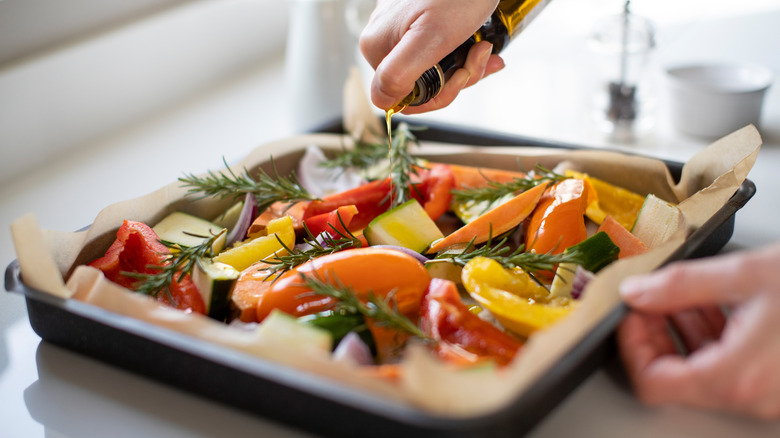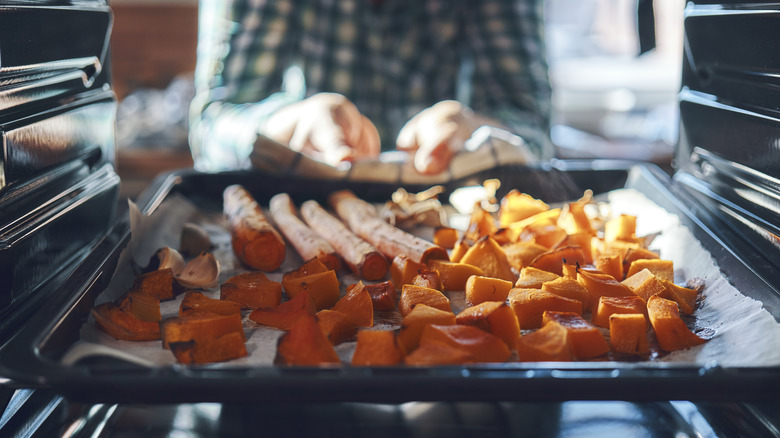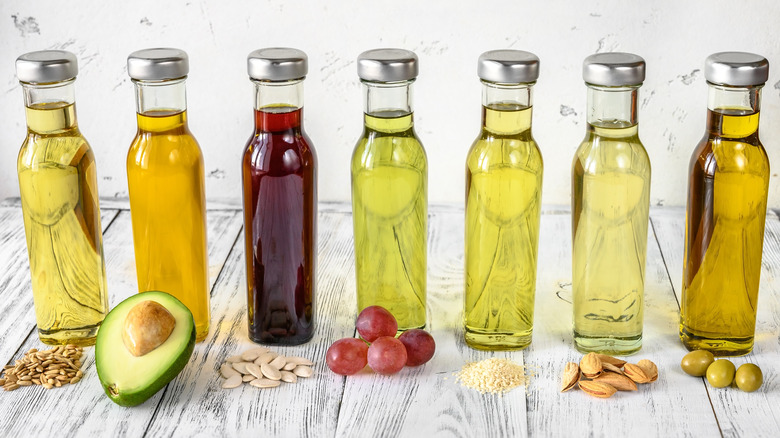When To Oil Your Roasted Vegetables For The Best Possible Flavor
While vegetables are good for you, they don't always sound good to eat. But a side of nicely seasoned and roasted veggies paired with a creamy chicken penne or a quality cut of steak will probably leave you feeling pretty good. From carrots to asparagus, roasting vegetables is a delicious way to prepare them. This cooking method draws out a rich, caramelized flavor, turns the insides of veggies tender, and lends a mouth-wateringly crispy texture to their outsides. And while roasting vegetables is fairly straightforward, there's one step in the process that surprisingly impacts how they taste: Oiling.
When you choose to oil vegetables it influences their flavor more than you might realize. Most recipes call for tossing prepped pieces in oil and seasonings before they go in the oven or air fryer. However, this could mask subtle flavors and aromas that vegetables release when roasted. So, if you want to make veggies something you look forward to and draw out their best possible flavor, oil them after roasting, not before.
Dry roast vegetables to draw out subtle flavors
Setting aside the bottle of oil and choosing to dry roast veggies instead can improve their flavor and texture. In an interview with Food & Wine, California chef Nick Balla acknowledges that there's nothing wrong with tossing vegetables in oil before popping them in the oven. Still, he considers dry roasting the best method as it draws out their natural and subtle flavors, from earthy notes in Brussels sprouts to tropical aromas in summer squashes. Since cooking oil brings its own flavor, removing it from the equation allows veggies to shine fully on their own. Plus, by leaving out the added moisture and fats until later, vegetables have the opportunity to crisp up more while they roast.
If you don't oil your veggies until after cooking them, you might be wondering when it's best to season them. Fortunately, tossing roasted vegetables in oil and seasonings or a compound butter can help them soak in more fully. "Dry roasted vegetables are like a sponge because they've lost so much liquid," Balla said. This allows the fats and any herbs or spices to absorb better into your veggies.
For anyone worried about sticking, Balla suggests using glass or cast iron. However, a glass casserole dish isn't the best choice if you're aiming for super crispy results, as the water-packed vegetables may end up steaming. The good news is you can always fall back on the old reliable sheet pan and line it with parchment paper or aluminum foil.
Types of oil to use on roasted vegetables
Not all oils are suitable for roasting vegetables. When cooking with high heat, it's important to consider the types of fat present in cooking oils. This is because polyunsaturated fats can break down at high temperatures, becoming toxic and risky for your health, according to a scientific study published in Foodservice Research International. On the other hand, monounsaturated fats are heat-stable, making them a safe choice.
If you do prefer to oil veggies before roasting, that's perfectly okay — and there are safe cooking oils out there for you. (Plus, you're in good company as plenty of chefs opt for early oiling, including celebrity chef Ina Garten, who uses this approach for adding oil to her roasted vegetables.) When choosing a monounsaturated cooking oil to toss veggies in, light olive oil is a reliable go-to. It has a neutral flavor and a high smoke point of about 465 degrees Fahrenheit. Avocado oil is another great option for the same reasons. It boasts a particularly high smoke point of 520 degrees Fahrenheit; and avocado oil is just as healthy as olive oil.
When it comes to which cooking oils shouldn't go on your oven-ready vegetables, don't reach for sunflower, corn, soybean, or flaxseed oils. Thankfully, though, by oiling your roasted veggies right before serving, you can dodge these dangers altogether. So, not only is dry roasting better for achieving maximum flavor, but it can be better for your health, too. What's not to love?


